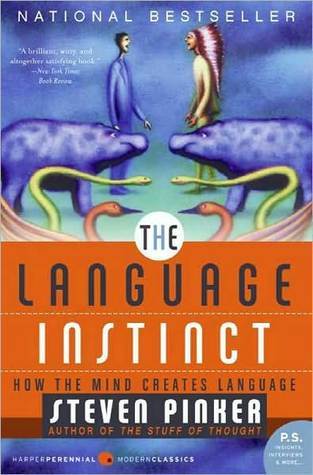More on this book
Community
Kindle Notes & Highlights
Read between
July 20 - September 10, 2019
The best definition comes from the linguist Max Weinreich: a language is a dialect with an army and a navy.
The highest percentage of ungrammatical sentences was found in the proceedings of learned academic conferences.
As for government euphemism, it is contemptible not because it is a form of mind control but because it is a form of lying. (Orwell was quite clear about this in his masterpiece essay.) For example, “revenue enhancement” has a much broader meaning than “taxes,” and listeners naturally assume that if a politician had meant “taxes” he would have said “taxes.”
speakers of different languages have to pay attention to different aspects of reality simply to put words together into grammatical sentences.
We cut nature up, organize it into concepts, and ascribe significances as we do, largely because we are parties to an agreement to organize it in this way—an agreement that holds throughout our speech community and is codified in the patterns of our language. The agreement is, of course, an implicit and unstated one, but its terms are absolutely obligatory; we cannot talk at all except by subscribing to the organization and classification of data which the agreement decrees.
I am indeed the truest friend of the German language—and not only now, but from long since—yes, before twenty years already…. I would only some changes effect. I would only the language method—the luxurious, elaborate construction compress, the eternal parenthesis suppress, do away with, annihilate; the introduction of more than thirteen subjects in one sentence forbid; the verb so far to the front pull that one it without a telescope discover can. With one word, my gentlemen, I would your beloved language simplify so that, my gentlemen, when you her for prayer need, One her yonder-up
...more
none do let what Schiller did: he has the whole history of the Thirty Years’ War between the two members of a separate verb in-pushed. That has even Germany itself aroused, and one has Schiller the permission refused the History of the Hundred Years’ War to compose—God be it thanked! After all these reforms established be will, will the German language the noblest and the prettiest on the world be.
we drive on a parkway but park in a driveway, there is no ham in hamburger or bread in sweetbreads, and blueberries are blue but cranberries are not cran.
If a speaker is interrupted at a random point in a sentence, there are on average about ten different words that could be inserted at that point to continue the sentence in a grammatical and meaningful way. (At some points in a sentence, only one word can be inserted, and at others, there is a choice from among thousands; ten is the average.)
can end in five prepositions. Daddy trudges upstairs to Junior’s bedroom to read him a bedtime story. Junior spots the book, scowls, and asks, “Daddy, what did you bring that book that I don’t want to be read to out of up for?”
“the X-bar theory.”
The piece of information that makes one language different from another is called a parameter.
verbs like dine are called “intransitive” and verbs like devour are called “transitive.”
“vocative”
The word will is an example of an auxiliary,
predicate
In Boston there is an old joke about a woman who landed at Logan Airport and asked the taxi driver, “Can you take me someplace where I can get scrod?” He replied, “Gee, that’s the first time I’ve heard it in the pluperfect subjunctive.”
why English spelling is not as deranged as it first appears.
The complaint about English spelling, of course, is that it pretends to capture the sounds of words but does not.
Beware of heard, a dreadful word That looks like beard and sounds like bird, And dead: it’s said like bed, not bead— For goodness’ sake don’t call it “deed”! Watch out for meat and great and threat (They rhyme with suite and straight and
debt).
ménage à quatre.
“The English language is a rich verbal tapestry woven together from the tongues of the Greeks, the Latins, the Angles, the Klaxtons, the Celtics, and many more other ancient peoples, all of whom had severe drinking problems.”
pedagogical
“Any language is a supreme achievement of a uniquely human collective genius, as divine and endless a mystery as a living organism.”
“The loss of a language is part of the more general loss being suffered by the world, the loss of diversity in all things.”


